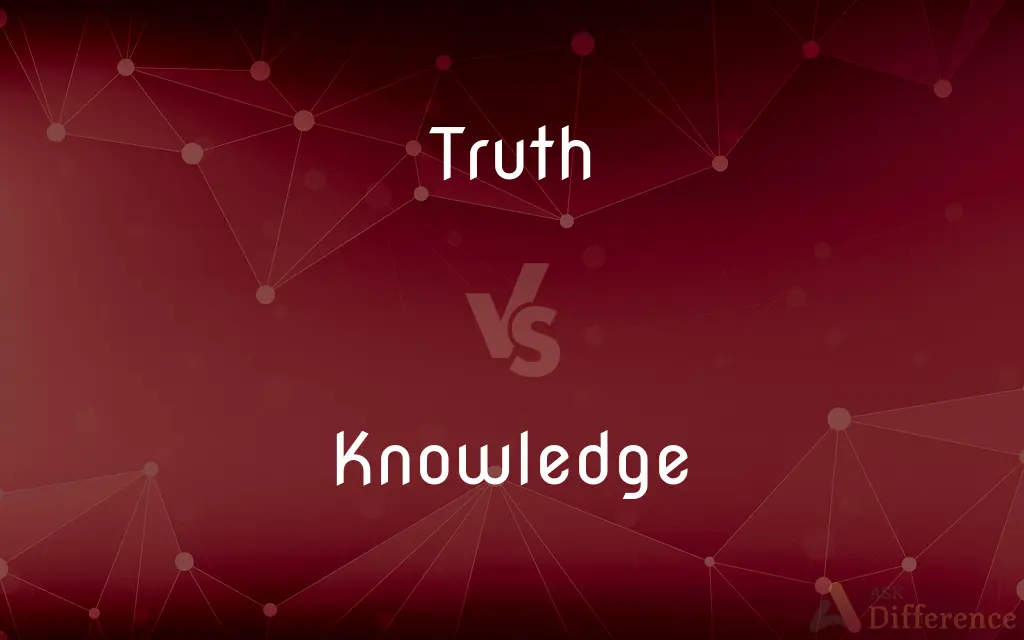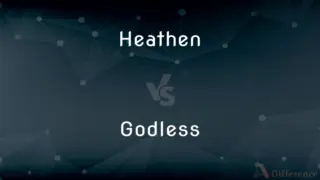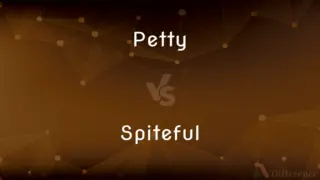Truth vs. Knowledge — What's the Difference?
By Urooj Arif & Maham Liaqat — Updated on March 14, 2024
Truth is the conformity of a statement to reality or fact, while knowledge refers to the information, understanding, and skills acquired through experience or education.

Difference Between Truth and Knowledge
Table of Contents
ADVERTISEMENT
Key Differences
Truth is a concept that deals with the accuracy and authenticity of assertions, propositions, or beliefs in relation to reality or facts. It is often considered in philosophical, scientific, and everyday contexts as a measure of fidelity to an original or standard. Knowledge, on the other hand, encompasses the accumulation of facts, information, and skills that individuals gain through experiences, education, or introspection. It represents the understanding or awareness one has about various subjects, phenomena, or practices.
While truth is concerned with the objective correspondence between statements and the external world, knowledge involves a subjective cognitive grasp of facts, principles, or techniques, often contextualized within a specific domain or field. The pursuit of truth is a foundational aspect of various disciplines, guiding the validation of theories, beliefs, and practices. Knowledge, in contrast, is more about the acquisition, organization, and application of information, serving as a basis for reasoning, decision making, and action.
Truth is often seen as immutable and universal, transcending individual perspectives or interpretations. Knowledge, however, can be dynamic, expanding, and evolving as new information is discovered or as understanding deepens. It is also inherently tied to the perspective and context of the knower, influenced by cultural, historical, and personal factors.
The relationship between truth and knowledge is intricate, as acquiring knowledge often involves the search for truth, while understanding what is true can enhance and expand one's knowledge. Philosophical discussions frequently explore the nature of this relationship, examining how we come to know truths and how our knowledge shapes our conception of what is true.
Understanding the distinction between truth and knowledge is essential in various fields, from science and philosophy to everyday decision making, highlighting the importance of critical thinking and the ongoing quest for understanding and accuracy in our interactions with the world.
ADVERTISEMENT
Comparison Chart
Definition
Conformity of a statement to reality or fact
Information, understanding, and skills acquired through experience or education
Nature
Often considered objective and universal
Subjective, dynamic, and context-dependent
Focus
Accuracy and authenticity of assertions in relation to reality
Accumulation and application of facts, information, and skills
Role in Disciplines
Guides validation of theories, beliefs, and practices
Serves as a basis for reasoning, decision making, and action
Philosophical Context
Explored in discussions on the nature of reality and belief
Examined in theories of epistemology (the study of knowledge)
Compare with Definitions
Truth
Immutable and not influenced by perspectives or interpretations.
Mathematical truths, like 2+2=4, are universal.
Knowledge
Facts, information, and skills acquired through experience or education.
His extensive knowledge of history was evident in his writings.
Truth
The quality or state of being in accordance with fact or reality.
The truth of her statement was confirmed by the evidence.
Knowledge
The theoretical or practical understanding of a subject.
She has a deep knowledge of molecular biology.
Truth
In philosophical context, often aligned with concepts of reality, belief, and justification.
Philosophers debate the nature of truth and its correspondence with reality.
Knowledge
Awareness or familiarity gained by experience of a fact or situation.
Gaining knowledge of other cultures enriches our own perspectives.
Truth
A fact or belief that is accepted as true.
It is an undeniable truth that the Earth orbits the Sun.
Knowledge
Can be categorized into different types, such as explicit, tacit, procedural, and declarative.
Riding a bike involves tacit knowledge, which is hard to explain in words.
Truth
Truth is the property of being in accord with fact or reality. In everyday language, truth is typically ascribed to things that aim to represent reality or otherwise correspond to it, such as beliefs, propositions, and declarative sentences.Truth is usually held to be the opposite of falsehood.
Knowledge
Knowledge is a familiarity, awareness, or understanding of someone or something, such as facts (descriptive knowledge), skills (procedural knowledge), or objects (acquaintance knowledge). By most accounts, knowledge can be acquired in many different ways and from many sources, including but not limited to perception, reason, memory, testimony, scientific inquiry, education, and practice.
Truth
Conformity to fact or actuality
Does this story have any truth?.
Knowledge
Facts, information, and skills acquired through experience or education; the theoretical or practical understanding of a subject
A thirst for knowledge
Her considerable knowledge of antiques
Truth
Reality; actuality
In truth, he was not qualified for the job.
Knowledge
Awareness or familiarity gained by experience of a fact or situation
The programme had been developed without his knowledge
He denied all knowledge of the incidents
Truth
The reality of a situation
The truth is, she respects your work.
Knowledge
The state or fact of knowing
Humans naturally aspire to knowledge.
Truth
A statement proven to be or accepted as true
Truths about nature.
Knowledge
Familiarity, awareness, or understanding gained through experience or study
Has great knowledge of these parts.
Has only limited knowledge of chemistry.
Truth
Such statements considered as a group
Researchers in pursuit of truth.
Knowledge
The sum or range of what has been perceived, discovered, or learned
The extraordinary knowledge housed in the library.
Truth
Sincerity; integrity
The truth of his intentions.
Knowledge
(Archaic) Carnal knowledge.
Truth
Fidelity to an original or standard
The truth of the copy.
Knowledge
The fact of knowing about something; general understanding or familiarity with a subject, place, situation etc.
His knowledge of Iceland was limited to what he'd seen on the Travel Channel.
Truth
Theology & Philosophy That which is considered to be the ultimate ground of reality.
Knowledge
Awareness of a particular fact or situation; a state of having been informed or made aware of something.
Truth
(Logic) The positive (true) truth-value.
Knowledge
Intellectual understanding; the state of appreciating truth or information.
Knowledge consists in recognizing the difference between good and bad decisions.
Truth
True facts, genuine depiction or statements of reality.
The truth is that our leaders knew a lot more than they were letting on.
Knowledge
Familiarity or understanding of a particular skill, branch of learning etc.
Does your friend have any knowledge of hieroglyphs, perchance?
A secretary should have a good knowledge of shorthand.
Truth
Conformity to fact or reality; correctness, accuracy.
There was some truth in his statement that he had no other choice.
Knowledge
(philosophical) Justified true belief
Truth
The state or quality of being true to someone or something.
Truth to one's own feelings is all-important in life.
Knowledge
(obsolete) Information or intelligence about something; notice.
Truth
(archaic) Faithfulness, fidelity.
Knowledge
The total of what is known; all information and products of learning.
His library contained the accumulated knowledge of the Greeks and Romans.
Truth
(obsolete) A pledge of loyalty or faith.
Knowledge
(countable) Something that can be known; a branch of learning; a piece of information; a science.
Truth
Conformity to rule; exactness; close correspondence with an example, mood, model, etc.
Knowledge
(obsolete) Acknowledgement.
Truth
That which is real, in a deeper sense; spiritual or ‘genuine’ reality.
The truth is what is.
Alcoholism and redemption led me finally to truth.
Knowledge
(obsolete) Notice, awareness.
Truth
(countable) Something acknowledged to be true; a true statement or axiom.
Hunger and jealousy are just eternal truths of human existence.
Knowledge
The deep familiarity with certain routes and places of interest required by taxicab drivers working in London, England.
Truth
Topness; the property of a truth quark.
Knowledge
(obsolete) To confess as true; to acknowledge.
Truth
(games) In the game truth or dare, the choice to truthfully answer a question put forth.
When asked truth or dare, he picked truth.
Knowledge
The act or state of knowing; clear perception of fact, truth, or duty; certain apprehension; familiar cognizance; cognition.
Knowledge, which is the highest degree of the speculative faculties, consists in the perception of the truth of affirmative or negative propositions.
Truth
To assert as true; to declare; to speak truthfully.
Knowledge
That which is or may be known; the object of an act of knowing; a cognition; - chiefly used in the plural.
There is a great difference in the delivery of the mathematics, which are the most abstracted of knowledges.
Knowledges is a term in frequent use by Bacon, and, though now obsolete, should be revived, as without it we are compelled to borrow "cognitions" to express its import.
To use a word of Bacon's, now unfortunately obsolete, we must determine the relative value of knowledges.
Truth
To make exact; to correct for inaccuracy.
Knowledge
That which is gained and preserved by knowing; instruction; acquaintance; enlightenment; learning; scholarship; erudition.
Knowledge puffeth up, but charity edifieth.
Ignorance is the curse of God;Knowledge, the wing wherewith we fly to heaven.
Truth
To tell the truth.
Knowledge
That familiarity which is gained by actual experience; practical skill; as, a knowledge of life.
Shipmen that had knowledge of the sea.
Truth
The quality or being true; as: - (a) Conformity to fact or reality; exact accordance with that which is, or has been; or shall be.
Knowledge
Scope of information; cognizance; notice; as, it has not come to my knowledge.
Why have I found grace in thine eyes, that thou shouldst take knowledge of me?
Truth
Conformity to rule; exactness; close correspondence with an example, mood, object of imitation, or the like.
Plows, to go true, depend much on the truth of the ironwork.
Knowledge
To acknowledge.
Truth
That which is true or certain concerning any matter or subject, or generally on all subjects; real state of things; fact; verity; reality.
Speak ye every man the truth to his neighbor.
I long to know the truth here of at large.
The truth depends on, or is only arrived at by, a legitimate deduction from all the facts which are truly material.
Truth
Fidelity; constancy; steadfastness; faithfulness.
Alas! they had been friends in youth,But whispering tongues can poison truth.
Truth
A true thing; a verified fact; a true statement or proposition; an established principle, fixed law, or the like; as, the great truths of morals.
Even so our boasting . . . is found a truth.
Truth
The practice of speaking what is true; freedom from falsehood; veracity.
If this will not suffice, it must appearThat malice bears down truth.
Truth
Righteousness; true religion.
Grace and truth came by Jesus Christ.
Sanctify them through thy truth; thy word is truth.
He that doeth truth cometh to the light.
Truth
To assert as true; to declare.
Had they [the ancients] dreamt this, they would have truthed it heaven.
Truth
A fact that has been verified;
At last he knew the truth
The truth is the he didn't want to do it
Truth
Conformity to reality or actuality;
They debated the truth of the proposition
The situation brought home to us the blunt truth of the military threat
He was famous for the truth of his portraits
He turned to religion in his search for eternal verities
Truth
A true statement;
He told the truth
He thought of answering with the truth but he knew they wouldn't believe it
Truth
The quality of nearness to the truth or the true value;
He was beginning to doubt the accuracy of his compass
The lawyer questioned the truth of my account
Common Curiosities
How do we determine what is true?
Determining truth often involves evidence, reasoning, and consensus among informed individuals, using methods appropriate to the context (e.g., scientific method, logical analysis).
Can truth change over time?
Truths related to factual and objective realities are generally immutable, but our understanding or interpretation of these truths can evolve.
Can someone know something that isn't true?
People can believe they know something that isn't true, often due to misinformation or misunderstanding; this is where the distinction between belief and knowledge becomes important.
How does culture influence knowledge?
Culture shapes the context in which knowledge is developed, shared, and interpreted, influencing what is considered important or true within that cultural setting.
Can knowledge exist without language?
While language greatly facilitates the transmission and development of knowledge, non-linguistic forms of knowledge, such as practical skills or intuitive understandings, can exist independently.
How do we acquire knowledge?
Knowledge can be acquired through direct experiences, education, observation, experimentation, and reasoning, among other methods.
Is all knowledge true?
Not all knowledge is necessarily true; it can be based on beliefs or understandings that may later be proven incorrect.
Is there a difference between knowing and understanding?
Yes, knowing can involve being aware of facts or possessing information, while understanding implies a deeper grasp of the connections, implications, and principles underlying the knowledge.
What is the relationship between knowledge and wisdom?
Wisdom involves the judicious application of knowledge, particularly in making decisions or judgments; it implies a deeper insight and moral understanding beyond mere possession of information.
What is the role of education in acquiring knowledge?
Education plays a crucial role in the structured acquisition and dissemination of knowledge, fostering critical thinking, and expanding one's understanding of various subjects.
Share Your Discovery

Previous Comparison
Heathen vs. Godless
Next Comparison
Petty vs. SpitefulAuthor Spotlight
Written by
Urooj ArifUrooj is a skilled content writer at Ask Difference, known for her exceptional ability to simplify complex topics into engaging and informative content. With a passion for research and a flair for clear, concise writing, she consistently delivers articles that resonate with our diverse audience.
Co-written by
Maham Liaqat















































